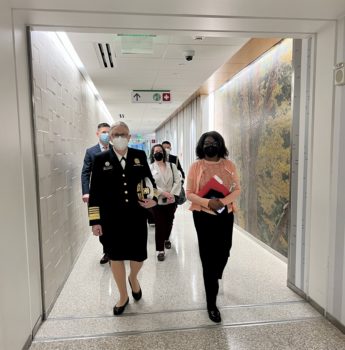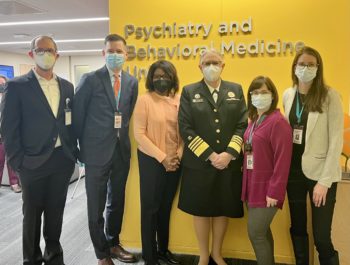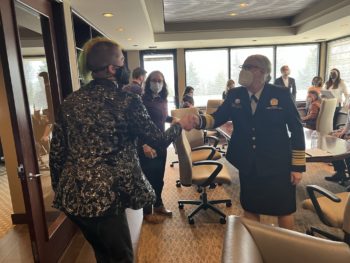
Admiral Rachel L. Levine, MD, U.S. Assistant Secretary for Health, made a rare visit to Seattle Children’s on Tuesday. Her visit included a tour of the Psychiatry and Behavioral Medicine Unit (PBMU), Emergency Department and the Seattle Children’s Gender Clinic.
Levine first met with PBMU leaders to discuss the national mental health crisis among adolescents. PBMU leaders described the significant increase they have seen in mental health-related visits to the emergency department, as well as an increase in youth suicide attempts/ideation. They told Levine how Seattle Children’s has developed innovative programs like the Behavioral Health Crisis Care Clinic to address the need we see every day in our Emergency Department. However, even with these innovations, the team can’t keep pace with the numbers of youth and families coming to our Emergency Department with mental health concerns.
“We have had an increase in the number of mental health issues that our youth are facing, which has been exacerbated by the COVID-19 pandemic – youth with depression, anxiety, eating disorders and other mental health concerns. President Biden discussed this in the State of the Union, and Secretary Becerra and I, and others at the Department of Health and Human Services (HHS) are on the road talking about the importance of mental health care for youth and their families, and the challenges that we are facing in this nation,” Levine noted in an interview with local radio station KNKX about why she was meeting with hospital leaders on her trip. “We are working to improve the mental health system to care for youth in terms of the workforce, programs and resources available to help. I am here to talk with the fantastic staff at Seattle Children’s hospital about the programs they have developed.” 
Additionally, Levine was taken on a walkthrough of the Seattle Children’s Gender Clinic. As the first openly transgender presidential and federally confirmed appointee, she sat down with leaders of the Gender Clinic team and two transgender youth who are members of the clinic’s youth advisory board to have a candid conversation about their experiences and how she can best support them from her position within the government.
They discussed how, despite the advantages of having access to the Gender Clinic, transgender youth have clear challenges based simply on their gender identity, especially in a year when many state legislatures have enacted or are considering legislation to limit access to gender-affirming care.
While anti-trans measures are not being enacted in Washington, the advancement of legislation in nearby states has had a negative effect on Gender Clinic patients and staff, as Seattle Children’s serves patients and families across Idaho, Montana, Alaska and Oregon, in addition to those in Washington.
Levine assured them that she will do everything she can to advocate for the LGBTQI+ community, including working on policy that would make blocking gender-affirming care illegal.

Adds Levine, “[Transgender and gender diverse] youth are vulnerable, and they need to be empowered. There are significant mental health challenges that trans and gender diverse youth face – anxiety, depression, etc. – and I want to make it very clear, there is nothing about being transgender or gender diverse, or being a part of the LGBTQI+ community, that would predispose one toward having depression or anxiety or other mental health issues. It is harassment, bullying. It is the discrimination that LGBTQI+ people face, and in this case trans youth, that can lead to those challenges. The [Gender Clinic program at Seattle Children’s] has medical professionals for evaluation and treatment, but importantly mental health professionals for evaluation and treatment as well. It is truly quite an excellent program.”

